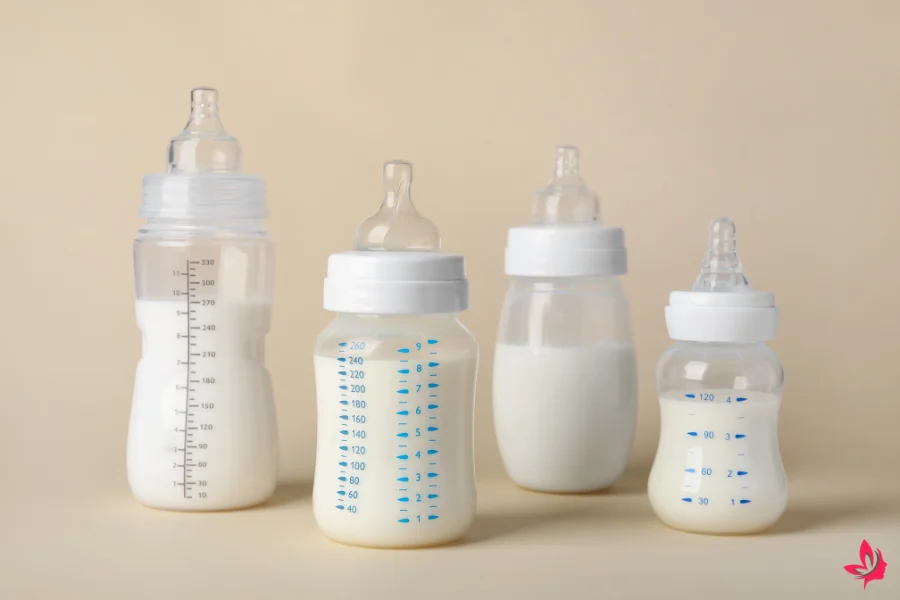Does formula make babies sleep longer? Many parents wonder if choosing formula over breastfeeding will help their little ones rest.
Research suggests that formula-fed babies often sleep longer than breastfed infants. This is because formula takes more time to digest, keeping babies fuller and longer.
Parents seeking to improve their baby’s sleep patterns may explore if feeding choices can make a difference.
This article delves into the science behind sleep duration and its relationship to infant nutrition. It provides insights into whether switching to the formula could help extend those precious hours of rest.
Beyond the nutritional aspects, you will find practical tips to manage sleep duration, regardless of feeding choice. This exploration will equip parents with strategies to support their baby’s sleep.
Understanding Infant Sleep Patterns

Infant sleep patterns vary greatly depending on several factors, including feeding methods and developmental stages.
Some parents wonder if formula-fed babies sleep longer or if breastfed babies have different sleep habits.
Sleep Development in Infants
Young babies undergo significant changes in their sleep patterns during their early months. Newborn babies often have fragmented sleep cycles, waking frequently throughout a 24-hour period.
As they grow, their sleep-wake cycles mature, and they may start sleeping for longer stretches at night.
The circadian rhythm develops in the first year of life, helping regulate their sleep patterns. Some experts suggest establishing a consistent bedtime routine can support better sleep for breastfed and formula-fed infants.
Growth spurts and other developmental milestones can also affect how much sleep a baby gets.
Comparisons Across Feeding Methods
Many new parents question whether formula-fed babies sleep longer than breastfed babies.
Research has shown that some formula-fed babies might initially sleep longer because formula takes more time to digest than breast milk. However, breast milk provides crucial sleep hormones that help babies settle more easily after night feedings.
Breastfeeding moms may notice their breastfed infants waking more often for night feeds in the early weeks. Yet, as babies grow, the sleep duration differences between breastfed and formula-fed become less pronounced.
The American Academy of Pediatrics recommends examining various factors, including the baby’s overall health, to determine what best supports a baby’s sleep habits. Creating a nurturing sleep environment for both groups is key to encouraging good sleep habits.
Breastfeeding and Its Effects on Sleep

Breastfeeding plays a significant role in a baby’s sleep patterns through its nutritional content and the influence of breastfeeding hormones.
These factors contribute uniquely to how newborn babies experience sleep during the early months of life.
Nutritional Components and Sleep
Breast milk is designed to support a newborn’s growth and development. It contains nutrients and hormones that align with an infant’s sleep-wake cycles.
Amino acids like tryptophan aid in producing melatonin, a sleep hormone that helps regulate sleep patterns.
Breastfed babies often have shorter sleep durations in the early weeks but enjoy regular feeding intervals. This can lead to more daytime feeds, helping them get enough sleep over a 24-hour period.
Despite this, breastfed infants typically experience more frequent night wakings than formula-fed babies. New parents might notice frequent feeding is necessary to maintain a steady milk supply and support their baby’s health.
Breastfeeding Hormones and Infant Sleep
Breastfeeding boosts certain hormones in mothers and infants that promote better sleep. Oxytocin, released during nursing, helps the baby relax, fostering a good night’s sleep. It also aids in bonding, creating a soothing environment for the baby.
The act of breastfeeding encourages physical contact, which enhances a baby’s sense of security. Though breastfed babies may require more night feeds, these interactions are beneficial for establishing healthy sleep associations and habits.
Research from the American Academy of Pediatrics suggests that breastfeeding can be linked to a reduced risk of sudden infant death syndrome (SIDS), highlighting the health benefits of this practice for young babies.
Formula Feeding and Sleep Duration

Formula-fed babies may sleep differently from breastfed infants due to factors such as formula digestibility and feeding schedules.
This section explores these aspects, helping new parents understand how formula could impact their baby’s sleep.
Digestibility of Formula
Formula-fed infants may sleep longer than breastfed babies because formula is thicker and less easily digested than breast milk. This can lead to longer stretches between feedings, allowing for more continuous sleep periods for both the baby and the parents.
Breast milk, rich in nutrients, is digested quickly, causing breastfed infants to wake more frequently for feeding.
The American Academy of Pediatrics highlights that while breast milk’s quick digestion aligns with newborn babies’ needs, formula can aid in prolonged sleep cycles. However, not all babies respond similarly, and individual differences can be significant.
Formula Feeding Schedules and Sleep Patterns
Feeding schedules may impact a baby’s sleep patterns. Formula feeding can establish a more predictable routine, which some find beneficial in managing nighttime sleep.
A structured schedule might result in more consistent nighttime waking patterns, allowing parents to anticipate when their baby might wake for a feed.
In the early weeks, caregivers might notice that young babies on formula sleep for longer blocks than breastfed babies.
As solid foods are gradually introduced around six months of age, sleep patterns might shift again. Regardless of the feeding method, a consistent bedtime routine can also help improve a baby’s sleep quality.
Review of Research Findings

Research indicates formula-fed babies might experience longer sleep durations than breastfed infants.
However, factors influencing a baby’s sleep, including feeding methods, are complex and interconnected, impacting new parents’ choices and experiences.
Comparative Studies on Feeding Methods and Sleep
Research shows that the relationship between infant formula and sleep duration is not straightforward.
Some studies suggest formula-fed infants sleep longer because formula takes more time to digest, possibly leading to fewer night wakings. For example, specific proteins in the formula might promote longer sleep.
Breastfed babies often wake more frequently at night for feedings, potentially consuming less milk per feeding due to faster digestion.
Experts agree that during the early months, babies, regardless of feeding method, have irregular sleep patterns due to developmental needs and growth spurts.
Implications of Research on Parental Choices
Choosing between breastfeeding and formula feeding involves various considerations other than sleep duration.
Some parents find the potential for better sleep with formula appealing. Yet, due to its health benefits, the American Academy of Pediatrics recommends exclusive breastfeeding for about the first six months.
New parents may grapple with decisions regarding formula feeding and its perceived impact on sleep.
Understanding that more than the feeding method alone influences each baby’s sleep patterns can help parents form realistic sleep plans.
A consistent bedtime routine and responding to a baby’s needs are vital in the first year of life. These practices help develop healthy sleep habits regardless of whether the baby is breastfeeding or using formula.
Parental Concerns and Considerations

New parents often wonder if formula-fed babies experience better sleep than breastfed babies.
These concerns involve myths about sleep patterns and personal beliefs influenced by culture and society. Understanding these can guide decisions about infant formula versus breastfeeding in the early months.
Addressing Sleep Myths
Many parents hear claims that formula-fed infants manage longer stretches of sleep. This belief stems from infant formula taking longer to digest, potentially resulting in fewer night wakings.
Yet, recent research indicates no significant differences in sleep duration between breastfed infants and those who use infant formula.
The American Academy of Pediatrics emphasizes that although breastfed babies might wake often, night feeds support a consistent milk supply and bonding through physical contact.
Due to their developing sleep-wake cycles, newborn babies’ sleep patterns are naturally irregular. Trusted health experts emphasize that breastfed and formula-fed babies will wake up at night during the first year of life, regardless of the feeding method.
Cultural and Personal Beliefs
Cultural influences play a huge role in parental choices about feeding and sleep.
In some cultures, exclusive breastfeeding is encouraged by health organizations like the World Health Organization for up to six months of age.
This is seen as optimal for a baby’s health and protection against diseases such as sudden infant death syndrome (SIDS).
In contrast, other cultures may support formula feeding due to beliefs about its convenience and the perception of better sleep for both the baby and the parents. Personal experiences from family or peers can also shape views, sometimes overruling medical advice.
Caregivers must receive well-rounded information to make informed decisions fitting their lifestyle and baby’s needs.
Practical Tips for Improving Infant Sleep

Helping infants sleep better involves creating routines and environments that support their natural sleep-wake cycles. New parents can encourage better sleep patterns in their young babies by focusing on consistency and comfort.
Establishing a Sleep Routine
A consistent bedtime routine is crucial for young babies. This routine should begin in the early months and include calming activities that prepare the baby for rest, such as a warm bath, gentle rocking, or reading a short book together.
Building this habit helps align the baby’s circadian rhythm with day and night cycles, making bedtime more predictable.
Newborn babies often wake due to hunger or discomfort. Night feeds are regular during the early weeks.
As babies grow, sleep associations like feeding before sleep should be minimized to encourage longer stretches of sleep. Avoiding overstimulation before bedtime is also a good idea to prevent the baby from becoming too alert.
Creating a Conducive Sleep Environment
The sleep environment plays a massive role in how well an infant sleeps. The American Academy of Pediatrics suggests that maintaining a quiet, dark, and cool room can help calm the baby for bedtime.
White noise machines or soft lullabies may soothe newborns by mimicking the sounds of the womb, reducing the chances of night waking.
Ensuring the crib is safe and free of loose bedding or toys reduces the risk of sudden infant death syndrome (SIDS).
Following the same feeding schedule each night can help create predictability in a baby’s routine. While some parents find formula feeding leads to longer sleep durations, the effect might vary depending on the baby’s needs.
Consulting Healthcare Professionals

New parents often seek guidance from healthcare professionals to navigate the uncertainties of their baby’s sleep patterns, whether they are using breast milk or formula feeding.
This section examines when parents might seek advice and what the role of pediatricians is in improving infant sleep.
When to Seek Advice
Parents should consult healthcare professionals if their newborn babies show irregular sleep patterns beyond the usual early weeks. Common concerns include whether formula-fed or breastfed babies sleep significantly less or more than is expected for their age.
Persistent nighttime waking and difficulty soothing can indicate a need for professional input. Parents of young babies should also contact healthcare professionals if they notice sleep issues related to nighttime feeding or are unsure how much sleep their babies should get.
Additionally, healthcare professionals can offer insights into developing age-appropriate sleep habits that can promote longer stretches of sleep.
Role of Pediatricians in Infant Sleep
Pediatricians are critical in supporting parents through their baby’s early months. They assess sleep-wake cycles and provide advice tailored to the baby’s needs.
Pediatricians also help families understand how different feeding methods might impact sleep quality. For example, they explain the effects of infant formula versus exclusive breastfeeding on nighttime feedings.
Moreover, pediatricians can help establish routines that improve sleep patterns, such as quiet bedtime routines or dream feeds.
Consulting with these experts can ease concerns about breastfeeding challenges or the impacts of formula feeding. They offer strategies to improve the baby’s sleep and overall well-being.
The World Health Organization and the American Academy of Pediatrics also provide valuable resources and recommendations for parents who want to optimize their baby’s sleep during the first year of life.
Conclusion
Does formula make babies sleep longer? This question often puzzles new parents seeking the best sleep solutions for their infants. Available studies and expert opinions vary, with no definite answer.
Some believe formula-fed babies sleep longer due to slower digestion, which could lead to more extended sleep patterns. Others argue that individual factors, such as sleep environment and routines, play more significant roles.
However, research shows no consistent difference in sleep duration between breastfed and formula-fed infants. Both groups of babies may wake frequently during the night in their first year.
Some experts emphasize looking beyond feeding choices and focusing on structure and routines for better infant sleep. Consistent bedtime practices can influence sleep more significantly than whether a baby is breastfed or formula-fed. The link between feeding type and sleep length remains inconclusive.
For more insights on optimizing sleep patterns, resources like Sleep Doctor can be helpful. Parents should also consider exploring the broader aspects of infant sleep needs to enhance restful nights.
Frequently Asked Questions
Studies generally do not show a significant difference in sleep duration between formula-fed and breastfed infants. However, individual experiences can vary, and some parents report different sleep patterns between the two.
Can feeding my baby formula enhance their sleep duration at night?
The formula may help some babies feel fuller for longer, which might encourage slightly longer periods of sleep. However, research does not consistently indicate that formula directly results in longer sleep for all babies, and sleep patterns can vary significantly between infants.
When can I expect a formula-fed baby to sleep through the night?
Formula-fed babies might sleep through the night slightly earlier than breastfed ones. Some formula-fed infants start sleeping longer, coinciding with developmental milestones, commonly around 4 to 6 months. Yet, this varies by individual.
What are the comparative effects of formula and breastmilk on a baby’s sleep pattern?
The impact of formula and breastmilk on sleep patterns is not conclusively different in studies. Both breastfed and formula-fed babies wake during the night for various reasons. Factors such as growth spurts and environmental influences can affect sleep.
Is there an ideal formula to promote better sleep for babies?
No specific formula guarantees improved sleep for babies. Formula options are designed to provide necessary nutrition rather than enhance sleep. Parents should consult pediatricians to choose suitable formulas for their baby’s needs.
How does nighttime breastfeeding influence milk supply?
Due to increased hormonal activity, nighttime breastfeeding helps maintain and boost milk supply. Prolactin, which supports milk production, is higher during night feedings, which can be beneficial for sustaining breastfeeding.
At what developmental stage do breastfed infants typically begin to sleep for longer intervals?
Breastfed infants often start sleeping for longer intervals as they grow. This usually happens around 4 to 6 months. Developmental changes, such as longer sleep cycles, play a role. Each infant’s progression is unique, and parents are encouraged to follow their child’s cues.




